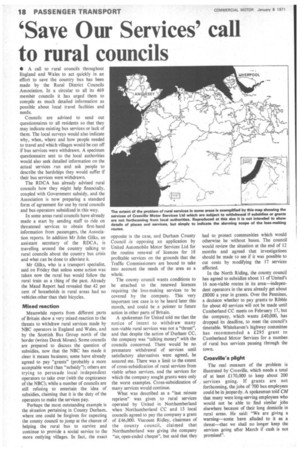'Save Our Services' call to rural councils
Page 20

If you've noticed an error in this article please click here to report it so we can fix it.
• A call to rural councils throughout England and Wales to act quickly in an effort to save the country bus has been made by the Rural District Councils Association. In a circular to all its 469 member councils it has urged them to compile as much detailed information as possible about local travel facilities and needs.
Councils are advised to send out questionnaires to all residents so that they may indicate existing bus services or lack of them. The local surveys would also indicate why, when, where and how people needed to travel and which villages would be cut off if bus services were withdrawn. A specimen questionnaire sent to the local authorities would also seek detailed information on the actual services run and ask people to describe the hardships they would suffer if their bus services were withdrawn.
The RDCA has already advised rural councils how they might help financially, coupled with Government subsidy, and the Association is now preparing a standard form of agreement for use by rural councils and bus operators subsidized in this way.
In some areas rural councils have already made a start by sending staff to ride on threatened services to obtain first-hand information from passengers, the Association reports. In addition Mr John Gilks, an assistant secretary of the RDCA, is travelling around the country talking to rural councils about the country bus crisis and what can be done to alleviate it.
Mr Gilks, who is a transport specialist, said on Friday that unless some action was taken now the rural bus would follow the rural train as a thing of the past. Already the Maud Report, had revealed that 42 per cent of households in rural areas had no vehicles other than their bicycles.
Mixed reaction Meanwhile reports from different parts of Britain show a very mixed reaction to the threats to withdraw rural services made by NBC operators in England and Wales, and by' the Scottish Bus Group north of the border (writes Derek Moses). Some councils are prepared to discuss the question of subsidies, now that the NBC has made it clear it means business; some have already agreed to pay "grants" (probably a more acceptable word than "subsidy"); others are trying to persuade local independent operators to take over (with the cognizance of the NBC); while a number of councils are still refusing to entertain the idea of subsidies, claiming that it is the duty of the operators to make the services pay.
Perhaps the most outstanding example is the situation pertaining in County Durham, where one could be forgiven for expecting the county Council to jump at the chance of helping the rural bus to survive and continue to provide a social service to the more outlying villages. In fact, the exact opposite is the case, and Durham County Council is opposing an application by United Automobile Motor Services Ltd for the routine renewal of licences for 18 profitable services on the grounds that the Traffic Commissioners are bound to take into account the needs of the area as a whole.
The county council wants conditions to be attached to the renewed licences requiring the loss-making services to be covered by the company. This very important test case is to be heard later this month, and could be a pointer to future action in other parts of Britain.
A spokesman for United told me that the notice of intent to withdraw many non-viable rural services was not a "threat", and that despite the action of Durham CC, the company was "talking money" with the councils concerned. There would be no premature withdrawal of services until satisfactory alternatives were agreed, he assured me. There was a limit to the extent of cross-subsidization of rural services from viable urban services, and the services for which the company sought grants were only the worst examples. Cross-subsidization of many services would continue.
What was described as a "last minute reprieve" was given to rural services operated by United in Northumberland when Northumberland CC and 13 local councils agreed to pay the company a grant of £46,000. Viscount Ridley, chairman of the county council, claimed that Northumberland was giving the company "an, open-ended cheque", but said that they had to protect communities which would otherwise be without buses. The council would review the situation at the end of 12 months and agreed that investigations should be made to see if it was possible to cut costs by modifying the 17 services affected.
In the North Riding, the county council has agreed to subsidize about 11 of United's 16 non-viable routes in its area—independent operators in the area already get about £8000 a year in grants. Over the Pennines, a decision whether to pay grants to Ribble for about 40 services will not be made until Cumberland CC meets on February 17, but the company, which wants £40,000, has dropped its deadline, to meet the council's timetable. Whitehaven's highway committee has recommended a £295 grant to Cumberland Motor Services for a number, of rural bus services passing through the town.
Crosville's pight The real measure of the problem is illustrated by Crosville, which needs a total of at least £170,000 to keep about 200 services going. If grants are not forthcoming, the jobs of 700 bus employees could be in jeopardy. A spokesman told CM that many were long-serving employees who would not be able to find similar jobs elsewhere because of their long domicile in rural areas. He said: "We are giving a warning—some have alluded to it as a threat—that we shall no longer keep the services going after March if cash is not promised".












































































































































